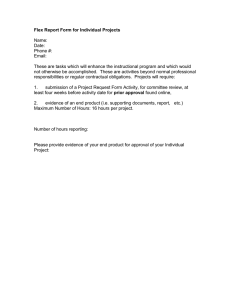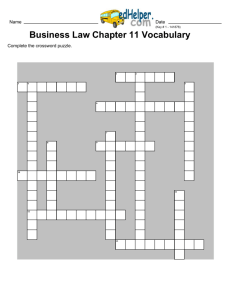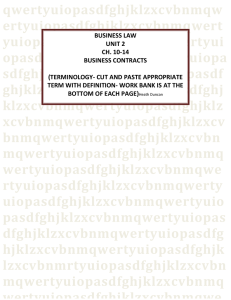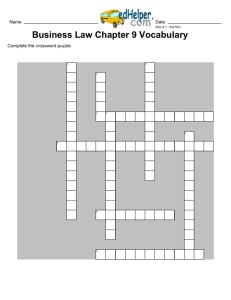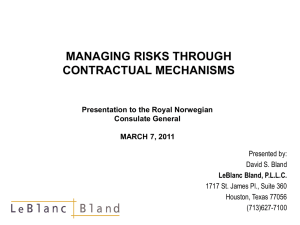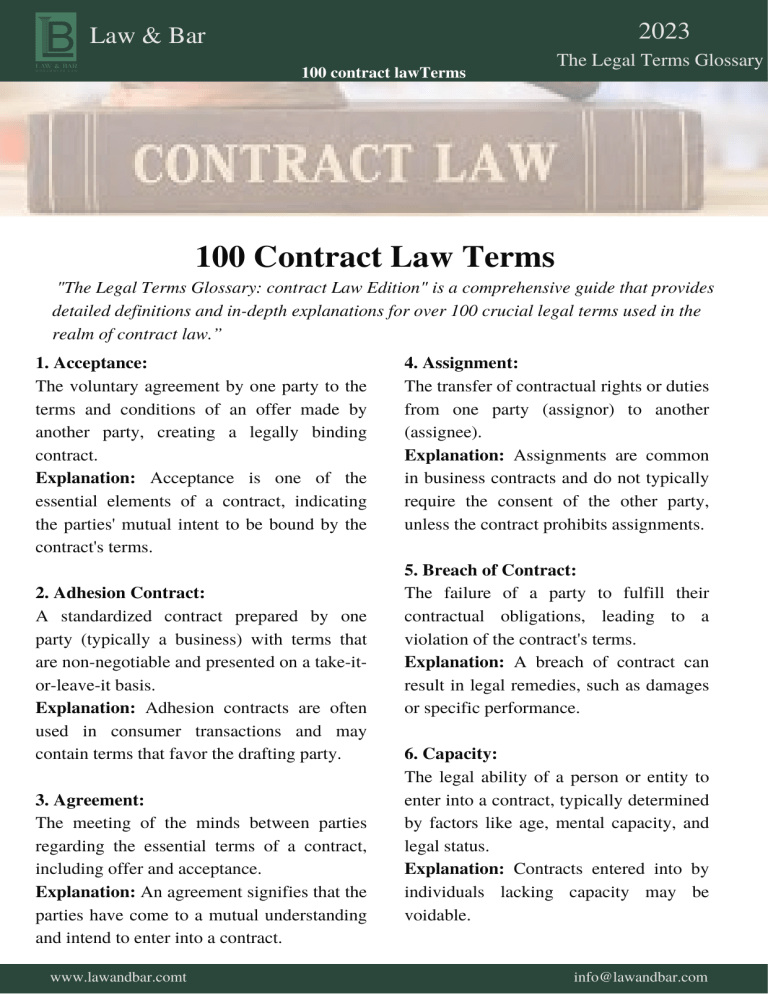
2023 Law & Bar 100 contract lawTerms The Legal Terms Glossary 100 Contract Law Terms "The Legal Terms Glossary: contract Law Edition" is a comprehensive guide that provides detailed definitions and in-depth explanations for over 100 crucial legal terms used in the realm of contract law.” 1. Acceptance: The voluntary agreement by one party to the terms and conditions of an offer made by another party, creating a legally binding contract. Explanation: Acceptance is one of the essential elements of a contract, indicating the parties' mutual intent to be bound by the contract's terms. 2. Adhesion Contract: A standardized contract prepared by one party (typically a business) with terms that are non-negotiable and presented on a take-itor-leave-it basis. Explanation: Adhesion contracts are often used in consumer transactions and may contain terms that favor the drafting party. 3. Agreement: The meeting of the minds between parties regarding the essential terms of a contract, including offer and acceptance. Explanation: An agreement signifies that the parties have come to a mutual understanding and intend to enter into a contract. www.lawandbar.comt 4. Assignment: The transfer of contractual rights or duties from one party (assignor) to another (assignee). Explanation: Assignments are common in business contracts and do not typically require the consent of the other party, unless the contract prohibits assignments. 5. Breach of Contract: The failure of a party to fulfill their contractual obligations, leading to a violation of the contract's terms. Explanation: A breach of contract can result in legal remedies, such as damages or specific performance. 6. Capacity: The legal ability of a person or entity to enter into a contract, typically determined by factors like age, mental capacity, and legal status. Explanation: Contracts entered into by individuals lacking capacity may be voidable. info@lawandbar.com 2023 Law & Bar 100 contract law Terms 7. Consideration: Something of value exchanged between parties in a contract, such as money, goods, services, or a promise to do or not do something. Explanation: Consideration is a fundamental element of a contract, demonstrating that there has been a bargained-for exchange. 8. Contract: A legally enforceable agreement between two or more parties that creates rights and obligations. Explanation: Contracts can be oral or written, though some types of contracts must be in writing to be enforceable. 9. Counteroffer: A response to an initial offer that introduces new terms or conditions, effectively rejecting the original offer. Explanation: A counteroffer extinguishes the original offer, creating a new proposal for consideration. 10. Covenant: A legally binding promise or commitment made within a contract, often specifying duties or restrictions. Explanation: Covenants can include noncompete clauses, confidentiality agreements, and other legally enforceable obligations. 11. Damages: Monetary compensation awarded to a party in a contract dispute to cover losses or harm suffered due to the other party's breach. www.lawandbar.comt The Legal Terms Glossary Explanation: Damages are typically categorized as compensatory (to cover actual losses), punitive (to punish the breaching party), or nominal (to acknowledge wrongdoing). 12. Default: Failure to perform or fulfill a contractual obligation as specified in the contract. Explanation: Default can result in various remedies, including termination of the contract or damages. 13. Duress: Unlawful pressure or coercion exerted on a party to induce them to enter into a contract against their will. Explanation: Contracts entered into under duress are typically voidable at the option of the victimized party. 14. Easement: A legal right that allows a person or entity to use another person's land for a specific purpose, such as access or utility services. Explanation: Easements can be created by agreement or by necessity and are subject to certain legal restrictions. 15. Executed Contract: A contract in which all parties have fulfilled their contractual obligations, and there are no remaining duties or performance requirements. Explanation: Once a contract is executed, it is considered completed, and the parties' rights and obligations are extinguished. info@lawandbar.com 2023 Law & Bar 100 contract law Terms 16. Executory Contract: A contract in which one or more parties have not yet fulfilled their contractual obligations. Explanation: Executory contracts involve ongoing duties and performance requirements for the parties involved. The Legal Terms Glossary Explanation: Forum selection clauses help avoid jurisdictional disputes and streamline the legal process in case of a dispute. 17. Express Contract: A contract in which the terms and conditions are explicitly stated, either in writing or verbally. Explanation: Express contracts leave no ambiguity regarding the parties' intent and obligations. 21. Fraudulent Misrepresentation: The intentional presentation of false information to induce another party to enter into a contract, leading to harm or damages. Explanation: Fraudulent misrepresentation can render a contract voidable and result in legal remedies for the victimized party. 18. Fiduciary Duty: The legal obligation of one party (usually a trustee or agent) to act in the best interests of another party (the beneficiary or principal) in a contract or business relationship. Explanation: Fiduciary duties include duties of loyalty, care, and disclosure. 22. Good Faith: The honest and fair dealing of parties in a contract, demonstrating sincerity and absence of fraudulent intent. Explanation: Parties are generally required to act in good faith throughout the contractual relationship. 19. Force Majeure: A contract provision that excuses a party's performance if unforeseeable events beyond their control prevent them from fulfilling their obligations. Explanation: Force majeure clauses are included in contracts to address situations like natural disasters, pandemics, or acts of war. 23. Implied Contract: A contract formed by the parties' actions and conduct, rather than by explicit written or verbal agreement. Explanation: Implied contracts are based on the parties' behavior and the reasonable expectations of the parties involved. 20. Forum Selection Clause: A contractual provision that specifies the jurisdiction or court where any disputes arising from the contract must be resolved. www.lawandbar.comt 24. Indemnification: A contractual provision in which one party agrees to compensate another party for specified losses, liabilities, or expenses. info@lawandbar.com 2023 Law & Bar 100 contract law Terms Explanation: Indemnification clauses are often used to allocate risk and protect parties from certain liabilities. 25. Integration Clause: A contractual provision that states the written contract contains the entire agreement between the parties and supersedes all prior oral or written agreements. Explanation: Integration clauses prevent parties from introducing extraneous evidence to contradict the written contract's terms. 26. Invitation to Treat: A preliminary communication or statement that invites others to make an offer, rather than constituting a binding offer itself. Explanation: An invitation to treat is not an offer and does not create a contractual obligation until an actual offer is accepted. 27. Liquidated Damages: Pre-determined damages specified in a contract as compensation for a specific breach. Explanation: Liquidated damages clauses help parties quantify potential losses in advance, avoiding the need for lengthy litigation over damages. 28. Material Breach: A significant and substantial violation of a contractual obligation that goes to the heart of the contract's purpose. Explanation: A material breach can entitle the non-breaching party to terminate the contract and seek damages. www.lawandbar.comt The Legal Terms Glossary 29. Meeting of the Minds: The mutual agreement and understanding between parties regarding the terms of a contract. Explanation: A meeting of the minds is essential for the formation of a valid contract. 30. Mutual Assent: The agreement between the parties to a contract, typically demonstrated through offer and acceptance. Explanation: Mutual assent is one of the essential elements required for a contract to be legally enforceable. 31. Novation: The replacement of an old contract with a new one, with the consent of all parties involved, effectively discharging the original contract. Explanation: Novation requires the agreement of all parties to release the old obligations and create new ones. 32. Offer: A proposal by one party to another, indicating a willingness to enter into a contract on specified terms and conditions. Explanation: An offer is the initial step in the contract formation process. 33. Parol Evidence Rule: A legal doctrine that limits the use of extrinsic evidence to interpret or contradict the terms of a fully integrated written contract. info@lawandbar.com 2023 Law & Bar 100 contract law Terms Explanation: The parol evidence rule aims to uphold the integrity of written contracts. 34. Prenuptial Agreement: A legally binding contract entered into by couples before marriage, specifying the division of assets, spousal support, and other financial matters in the event of divorce or death. Explanation: Prenuptial agreements provide financial protection and clarity for spouses in the event of marital dissolution. 35. Privity of Contract: The legal relationship that exists between the parties to a contract, allowing them to enforce the contract's terms. Explanation: Only parties in privity can sue or be sued for breach of contract. 36. Promissory Estoppel: A legal doctrine that allows a party to enforce a promise even if there is no formal contract, provided certain elements are met. Explanation: Promissory estoppel may apply when one party relies on another's promise to their detriment. 37. Quantum Meruit: A Latin term meaning "as much as is deserved," often used in contract law to refer to the fair and reasonable compensation for goods or services provided. Explanation: Quantum meruit claims can arise when a contract is not explicit regarding compensation. www.lawandbar.comt The Legal Terms Glossary 38. Ratification: The act of accepting and confirming a contract or transaction that was initially unauthorized or voidable. Explanation: Ratification typically requires the party's full knowledge of the contract's terms and their intent to be bound by it. 39. Rescission: The cancellation or termination of a contract, returning the parties to their precontractual positions. Explanation: Rescission is a remedy for voidable contracts or contracts entered into under duress, fraud, or misrepresentation. 40. Restitution: The return or compensation for benefits received by a party in a contract dispute, typically ordered by a court when a contract is rescinded. Explanation: Restitution aims to prevent unjust enrichment and ensure fairness between the parties. 41. Severability: A contractual provision that allows for the enforceability of individual contract terms even if other terms are found to be unenforceable or void. Explanation: Severability clauses preserve the validity of the contract as a whole, even if certain provisions are invalidated. info@lawandbar.com 2023 Law & Bar 100 contract law Terms The Legal Terms Glossary 42. Specific Performance: A legal remedy that compels a party to fulfill their contractual obligations, typically used when monetary damages are inadequate. Explanation: Specific performance is a remedy that is often sought in cases involving unique or irreplaceable items. 46. Time Is of the Essence: A contractual provision that emphasizes the importance of meeting specified deadlines and dates. Explanation: Time-is-of-the-essence clauses make timely performance a crucial aspect of the contract. 43. Statute of Frauds: A legal requirement that certain types of contracts be in writing to be enforceable, typically including contracts for the sale of real property, contracts lasting longer than one year, and contracts involving the sale of goods over a certain value. Explanation: The statute of frauds aims to prevent fraudulent claims and misunderstandings in oral agreements. 47. Unilateral Contract: A contract in which one party makes a promise in exchange for the other party's performance, typically a reward for completing a specified act. Explanation: Unilateral contracts are formed when the offeree performs the requested action, creating a binding contract. 44. Statute of Limitations: A legal time limit within which a party must file a lawsuit to enforce their contractual rights or seek remedies for breach. Explanation: Failing to file a lawsuit within the statute of limitations may result in the loss of the right to sue. 45. Third-Party Beneficiary: A person or entity who is not a party to a contract but is intended to receive a benefit from the contract's performance. Explanation: Third-party beneficiaries may have legal rights to enforce the contract under certain conditions. www.lawandbar.comt 48. Unjust Enrichment: A legal doctrine that allows a party to recover compensation when another party has benefited unfairly or without legal justification. Explanation: Unjust enrichment aims to prevent one party from profiting at the expense of another without fulfilling their obligations. 49. Usury: The illegal charging of excessively high interest rates on loans or contracts, typically regulated by state usury laws. Explanation: Usury laws protect borrowers from exploitative lending practices. info@lawandbar.com 2023 Law & Bar 100 contract law Terms 50. Valid Contract: A legally binding contract that meets all the necessary elements, including offer, acceptance, consideration, and legal capacity. Explanation: Valid contracts are enforceable by the parties involved. 51. Waiver: The voluntary and intentional relinquishment of a right or claim by a party to a contract. Explanation: A waiver may be express or implied and can impact the parties' rights under the contract. 52. Warranty: A guarantee or promise made by a party in a contract regarding the quality, condition, or performance of goods or services. Explanation: Warranties can be express (explicitly stated) or implied by law (based on statutory requirements). 53. Waiver of Breach: A contractual provision that permits one party to waive or overlook a minor breach of contract without terminating the entire agreement. Explanation: Waiver of breach clauses allow parties to continue the contractual relationship despite minor violations. 54. Void Contract: A contract that lacks essential elements or is legally unenforceable from its inception. www.lawandbar.comt The Legal Terms Glossary Explanation: Void contracts are considered invalid and cannot be enforced by either party. 55. Voidable Contract: A contract that is valid but can be voided or canceled at the option of one of the parties due to factors such as fraud, duress, or lack of capacity. Explanation: Voidable contracts remain in force until one party exercises their right to void the contract. 56. Without Prejudice: A phrase often used in negotiations to indicate that statements or offers made during discussions cannot be used against the party making them in future legal proceedings. Explanation: Without prejudice communications promote open and candid negotiations. 57. Anticipatory Repudiation: A situation in which one party to a contract indicates, before the agreed-upon performance date, that they will not fulfill their contractual obligations. Explanation: Anticipatory repudiation allows the non-breaching party to treat the contract as immediately breached and seek remedies. 58. Choice of Law Clause: A contractual provision that specifies which jurisdiction's laws will govern the contract and any disputes arising from it. info@lawandbar.com 2023 Law & Bar 100 contract law Terms The Legal Terms Glossary Explanation: Choice of law clauses help parties predict which legal principles will apply to their contract. Explanation: Joint and several liability ensures that the injured party can seek full recovery from any of the liable parties. 59. Entire Agreement Clause: A provision in a contract that stipulates that the written contract represents the entire agreement between the parties, superseding all prior oral or written agreements. Explanation: Entire agreement clauses prevent parties from relying on extraneous evidence to alter or contradict the contract's terms. 63. Letter of Intent (LOI): A preliminary written agreement between parties outlining the key terms and intentions for entering into a future contract. Explanation: LOIs are often used in complex transactions as a starting point for negotiations. 60. Exculpatory Clause: A contractual provision that attempts to release one party from liability for their own negligence or wrongdoing. Explanation: Exculpatory clauses are often subject to legal scrutiny and may be limited in their enforceability. 61. Invitation for Bid (IFB): A formal request issued by a buyer or organization inviting potential suppliers or contractors to submit competitive bids for the supply of goods or services. Explanation: IFBs are commonly used in public procurement and construction contracts to ensure transparency and fair competition. 62. Joint and Several Liability: A legal principle that allows multiple parties to be held collectively and individually responsible for fulfilling a contractual obligation or paying damages. www.lawandbar.comt 64. Meeting of the Minds: The mutual agreement and understanding between parties regarding the terms of a contract. Explanation: A meeting of the minds is essential for the formation of a valid contract. 65. Mutual Assent: The agreement between the parties to a contract, typically demonstrated through offer and acceptance. Explanation: Mutual assent is one of the essential elements required for a contract to be legally enforceable. 66. Novation: The replacement of an old contract with a new one, with the consent of all parties involved, effectively discharging the original contract. Explanation: Novation requires the agreement of all parties to release the old obligations and create new ones. info@lawandbar.com 2023 Law & Bar 100 contract law Terms 67. Offer: A proposal by one party to another, indicating a willingness to enter into a contract on specified terms and conditions. Explanation: An offer is the initial step in the contract formation process. 68. Parol Evidence Rule: A legal doctrine that limits the use of extrinsic evidence to interpret or contradict the terms of a fully integrated written contract. Explanation: The parol evidence rule aims to uphold the integrity of written contracts. 69. Prenuptial Agreement: A legally binding contract entered into by couples before marriage, specifying the division of assets, spousal support, and other financial matters in the event of divorce or death. Explanation: Prenuptial agreements provide financial protection and clarity for spouses in the event of marital dissolution. 70. Privity of Contract: The legal relationship that exists between the parties to a contract, allowing them to enforce the contract's terms. Explanation: Only parties in privity can sue or be sued for breach of contract. The Legal Terms Glossary Explanation: Promissory estoppel may apply when one party relies on another's promise to their detriment. 72. Quantum Meruit: A Latin term meaning "as much as is deserved," often used in contract law to refer to the fair and reasonable compensation for goods or services provided. Explanation: Quantum meruit claims can arise when a contract is not explicit regarding compensation. 73. Ratification: The act of accepting and confirming a contract or transaction that was initially unauthorized or voidable. Explanation: Ratification typically requires the party's full knowledge of the contract's terms and their intent to be bound by it. 74. Rescission: The cancellation or termination of a contract, returning the parties to their precontractual positions. Explanation: Rescission is a remedy for voidable contracts or contracts entered into under duress, fraud, or misrepresentation. 71. Promissory Estoppel: A legal doctrine that allows a party to enforce a promise even if there is no formal contract, provided certain elements are met. www.lawandbar.comt info@lawandbar.com 2023 Law & Bar 100 contract law Terms 75. Restitution: The return or compensation for received by a party in a contract typically ordered by a court when a is rescinded. Explanation: Restitution aims to unjust enrichment and ensure between the parties. benefits dispute, contract prevent fairness 76. Severability: A contractual provision that allows for the enforceability of individual contract terms even if other terms are found to be unenforceable or void. Explanation: Severability clauses preserve the validity of the contract as a whole, even if certain provisions are invalidated. 77. Specific Performance: A legal remedy that compels a party to fulfill their contractual obligations, typically used when monetary damages are inadequate. Explanation: Specific performance is a remedy that is often sought in cases involving unique or irreplaceable items. 78. Statute of Frauds: A legal requirement that certain types of contracts be in writing to be enforceable, typically including contracts for the sale of real property, contracts lasting longer than one year, and contracts involving the sale of goods over a certain value. Explanation: The statute of frauds aims to prevent fraudulent claims and misunderstandings in oral agreements. www.lawandbar.comt The Legal Terms Glossary 79. Statute of Limitations: A legal time limit within which a party must file a lawsuit to enforce their contractual rights or seek remedies for breach. Explanation: Failing to file a lawsuit within the statute of limitations may result in the loss of the right to sue. 80. Time Is of the Essence: A contractual provision that emphasizes the importance of meeting specified deadlines and dates. Explanation: Time-is-of-the-essence clauses make timely performance a crucial aspect of the contract. 81. Unilateral Contract: A contract in which one party makes a promise in exchange for the other party's performance, typically a reward for completing a specified act. Explanation: Unilateral contracts are formed when the offeree performs the requested action, creating a binding contract. 82. Unjust Enrichment: A legal doctrine that allows a party to recover compensation when another party has benefited unfairly or without legal justification. Explanation: Unjust enrichment aims to prevent one party from profiting at the expense of another without fulfilling their obligations. info@lawandbar.com 2023 Law & Bar 100 contract law Terms 83. Usury: The illegal charging of excessively high interest rates on loans or contracts, typically regulated by state usury laws. Explanation: Usury laws protect borrowers from exploitative lending practices. 84. Valid Contract: A legally binding contract that meets all the necessary elements, including offer, acceptance, consideration, and legal capacity. Explanation: Valid contracts are enforceable by the parties involved. 85. Void Contract: A contract that lacks essential elements or is legally unenforceable from its inception. Explanation: Void contracts are considered invalid and cannot be enforced by either party. 86. Voidable Contract: A contract that is valid but can be voided or canceled at the option of one of the parties due to factors such as fraud, duress, or lack of capacity. Explanation: Voidable contracts remain in force until one party exercises their right to void the contract. 87. Warranty: A guarantee or promise made by a party in a contract regarding the quality, condition, or performance of goods or services. Explanation: Warranties can be express (explicitly stated) or implied by law (based on statutory requirements). www.lawandbar.comt The Legal Terms Glossary 88. Without Prejudice: A phrase often used in negotiations to indicate that statements or offers made during discussions cannot be used against the party making them in future legal proceedings. Explanation: Without prejudice communications promote open and candid negotiations. 89. Anticipatory Repudiation: A situation in which one party to a contract indicates, before the agreed-upon performance date, that they will not fulfill their contractual obligations. Explanation: Anticipatory repudiation allows the non-breaching party to treat the contract as immediately breached and seek remedies. 90. Joint and Several Liability: A legal principle that allows multiple parties to be held collectively and individually responsible for fulfilling a contractual obligation or paying damages. Explanation: Joint and several liability ensures that the injured party can seek full recovery from any of the liable parties. 91. Letter of Intent (LOI): A preliminary written agreement between parties outlining the key terms and intentions for entering into a future contract. Explanation: LOIs are often used in complex transactions as a starting point for negotiations. info@lawandbar.com 2023 Law & Bar 100 contract law Terms 92. Promissory Note: A written, legally binding document that outlines a promise by one party to pay a specific sum of money to another party at a specified time or on demand. Explanation: Promissory notes are commonly used in lending and financial transactions to formalize loan agreements. 93. Quasi-Contract (Implied-in-Law Contract): A legal doctrine that allows a court to impose contractual obligations on parties even in the absence of a formal contract when unjust enrichment would otherwise occur. Explanation: Quasi-contracts are equitable remedies used to prevent one party from benefiting unfairly at the expense of another. 94. Reservation of Rights: A statement made by a party to a contract to preserve their right to enforce certain terms or pursue legal remedies despite their performance or acceptance of nonconforming performance. Explanation: A reservation of rights is often used when one party suspects a breach of contract by the other party but wants to maintain their legal options. 95. Consequential Damages (Special Damages): Damages that result indirectly from a breach of contract and are not a direct consequence of the breach itself but are reasonably foreseeable by the parties. www.lawandbar.comt The Legal Terms Glossary Explanation: Consequential damages may include lost profits, business interruption, or additional expenses incurred due to the breach. 96. Confidentiality Agreement (NonDisclosure Agreement or NDA): A contract between parties that obligates them to keep certain information or trade secrets confidential and not disclose it to third parties. Explanation: Confidentiality agreements are commonly used to protect sensitive business information during negotiations or collaborations. 97. Covenant Not to Compete (NonCompete Agreement): A contractual provision in which one party agrees not to engage in a particular business or compete with the other party within a specified geographic area and for a specified duration. Explanation: Non-compete agreements are often used to protect a company's trade secrets and client relationships. 98. Estoppel: A legal doctrine that prevents a party from asserting a right or claim in a legal dispute because they previously made representations or acted in a way that contradicts their current position. Explanation: Estoppel is based on principles of fairness and preventing parties from taking inconsistent positions in legal proceedings. info@lawandbar.com 2023 Law & Bar 100 contract law Terms 99. Liquidated Damages Clause: A provision in a contract that specifies a predetermined number of damages that must be paid in case of a particular type of breach. Explanation: Liquidated damages clauses provide certainty and help parties avoid the need for costly litigation to determine damages. 100. Good Faith and Fair Dealing (Covenant of Good Faith and Fair Dealing): An implied duty in contracts that requires parties to act honestly and fairly in their dealings, refraining from conduct that would undermine the other party's rights. Explanation: The covenant of good faith and fair dealing ensures that parties to a contract do not take advantage of each other or act in bad faith. The Legal Terms Glossary Contracts are the backbone of countless transactions, from everyday agreements to multi-million-dollar deals. They are the threads that bind parties together in mutual understanding and, when necessary, offer recourse when those understandings are challenged. It is our belief that a well-informed grasp of contract law terminology can be the key to unlocking successful negotiations, avoiding disputes, and ensuring that agreements are both legally sound and ethically upheld. In the ever-evolving landscape of law and commerce, the significance of these terms remains unwavering. They form the foundation upon which contracts are built, and the knowledge within these pages is a beacon guiding you through the often complex and intricate terrain of contract law. Farewell, and may your contracts always be strong and true. TALK TO US WWW.lawandbar.com info@mollysrestaurant.com www.lawandbar.comt info@lawandbar.com
